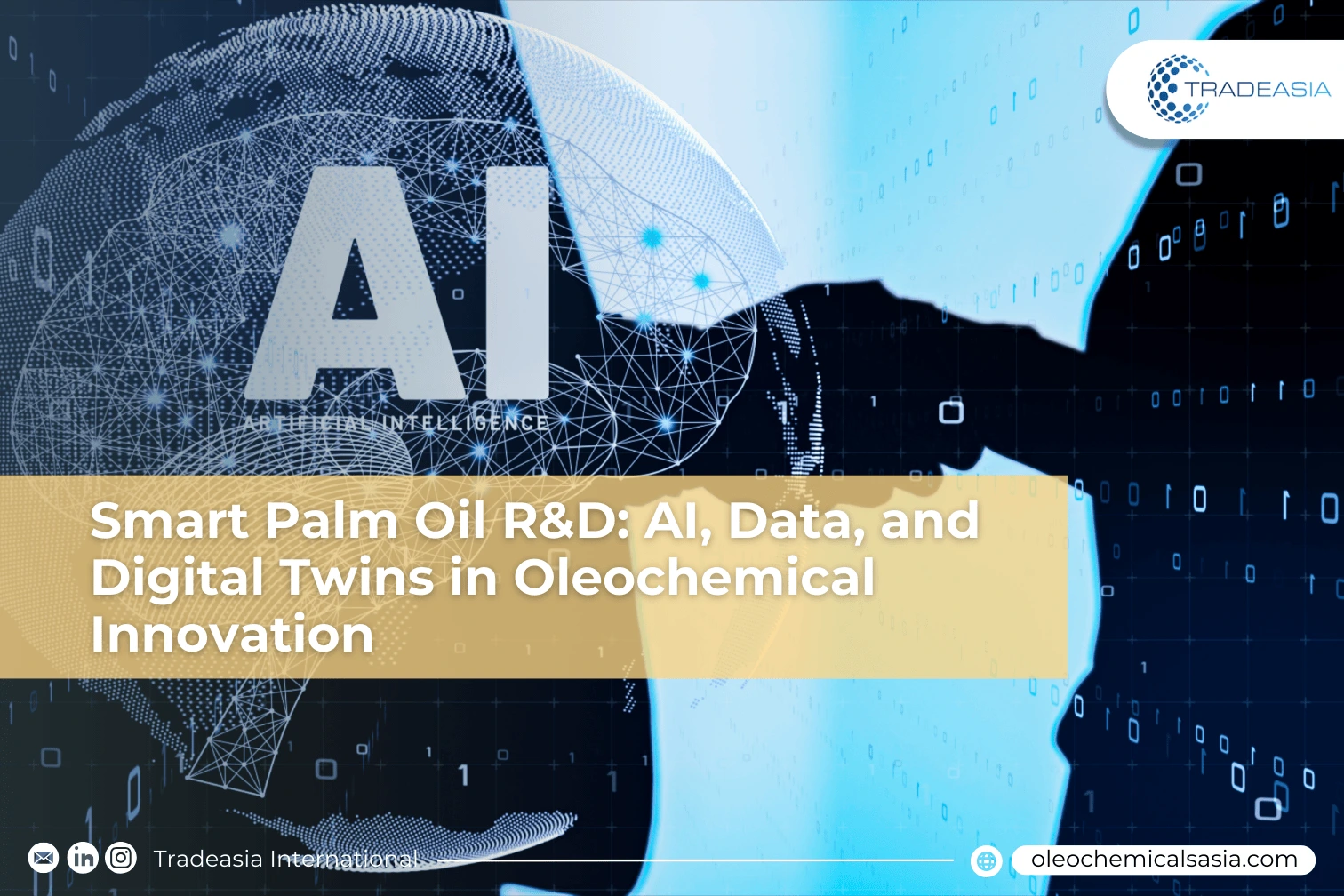How AI is Accelerating Chemical Discovery and Market Growth
Artificial intelligence (AI), machine learning (ML), and digital twins are reshaping research and development (R&D) in the palm oil oleochemical industry. As one of the world’s largest agricultural sectors, palm oil production—exceeding 70 million tons annually—supports a wide spectrum of downstream applications, from surfactants and emulsifiers to lubricants and bio-based chemicals. For a global raw material chemical trading company’s Palm SBU, these technologies are not just industry trends but critical enablers of competitive differentiation in both supply and product innovation.
The numbers reveal the scale of this transformation. The global AI in chemicals market was valued at approximately $2.19 billion in 2024 and is forecast to reach nearly $28.74 billion by 2034, driven by a 29.36% CAGR. Even more striking, generative AI in chemicals—which accelerates molecular design and reaction simulations—is projected to surge from $1.02 billion in 2024 to $23.3 billion by 2033, expanding at a 41.9% CAGR. These figures underscore the accelerating pace of AI adoption and the urgent need for palm-based businesses to align their strategies with this growth trajectory.
Within oleochemicals, AI models enable rapid virtual screening of molecular structures, dramatically reducing R&D time by 30–50% and cutting costs by up to 40%. This allows companies to bring innovative surfactants, emulsifiers, and bio-based materials to market more quickly and with greater precision. For SBU Palm, leveraging such capabilities strengthens its role as a reliable supplier of forward-looking, sustainable raw materials to global customers.
Digital Twins, Smart Agriculture, and Strategic Value for Palm SBU
The impact of digital transformation extends far beyond product discovery. Digital twin technology, for instance, allows virtual replication of palm oil refineries and pilot plants. By simulating chemical reactions and equipment performance, companies can test modifications, optimize yields, and minimize waste—all without interrupting live operations. For a trading company’s Palm SBU, this predictive capacity translates directly into stronger margins, higher reliability in supply, and improved environmental performance—factors that global buyers increasingly prioritize.
AI also drives significant change upstream at the plantation level. Precision agriculture supported by AI, GIS, and remote sensing technologies enables real-time monitoring of crop health, while blockchain and mobile platforms provide end-to-end traceability. These advancements ensure compliance with sustainability certifications and strengthen customer trust in palm-derived raw materials. For an SBU competing in global markets, this capability to guarantee transparent, sustainable sourcing is an essential lever for differentiation.
Although specific investment numbers for palm oil AI-driven R&D remain limited, the broader chemical industry trend demonstrates clear momentum. Governments and private sector leaders are actively channeling resources into AI algorithms, automation platforms, and robust data infrastructure. For SBU Palm, aligning with these initiatives positions the business not only as a participant but as a proactive contributor to the next wave of oleochemical innovation.
The convergence of AI, machine learning, and digital twins is not just transforming research and production processes—it is setting new performance benchmarks across the oleochemical value chain. By adopting these technologies, a Palm SBU can accelerate innovation pipelines, strengthen supply resilience, and reinforce commitments to sustainability. In today’s competitive market, this digital transformation is not optional; it is a strategic imperative for palm oil businesses to thrive and lead in the global oleochemical landscape.
Sources:
-
10 Ways AI is Being Used in the Chemical Industry
https://digitaldefynd.com/IQ/ai-in-chemical-industry/
-
Exploring the Potentials of Artificial Intelligence and Digital Technologies in Palm Oil Industry
https://ojs.sgsci.org/journals/jitp/issue43-paper431.html
-
AI in Chemical Industry: Top Use Cases You Need To Know
https://smartdev.com/ai-use-cases-in-chemical-industry/
-
Driving Palm Oil Sustainability Through Information Technology (IT) Innovation
https://mspo.org.my/mspo-blogs/driving-palm-oil-sustainability-through-information-technology-it-innovation
-
Generative AI in Chemicals Market Share & Size 2025-2035
https://www.metatechinsights.com/industry-insights/generative-ai-in-chemicals-market-3364

Leave a Comment